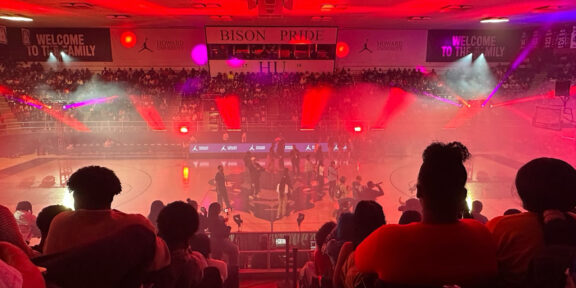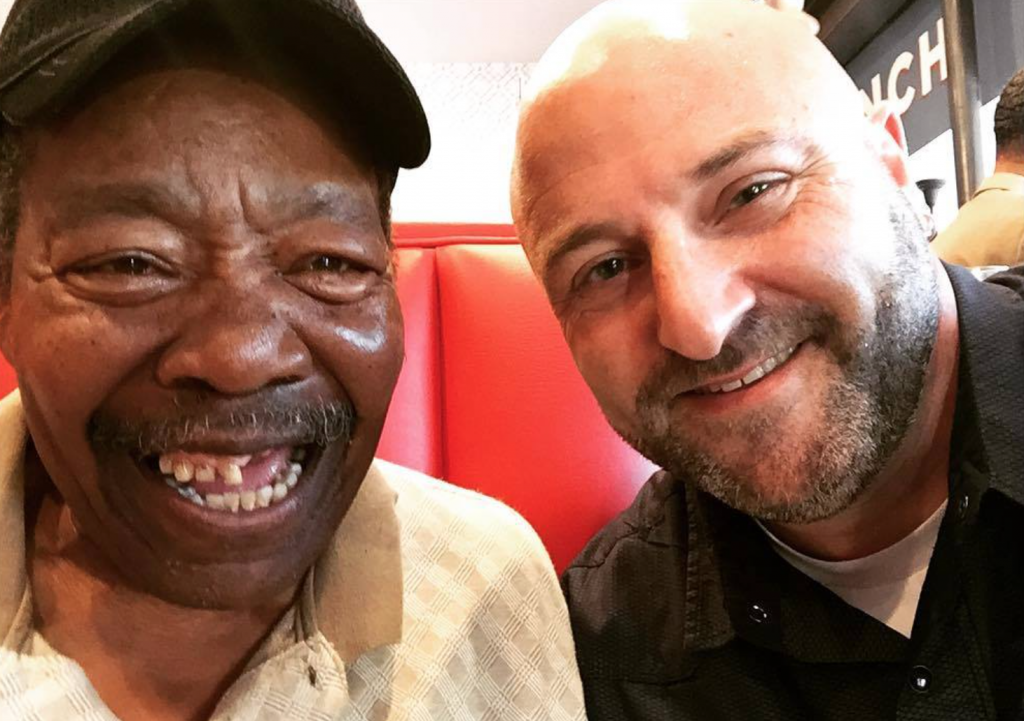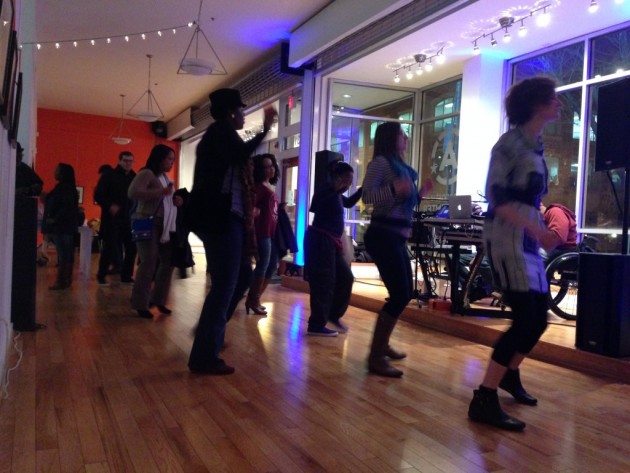Thousands of women gather on first anniversary of Trump’s inauguration

All photos by Maya King, HUNS: More than 10,000 marchers demonstrated during the Women's March in Baltimore. Similar women's marches were held in more than a dozen other cities, including Washington, New York and Las vegas.
BALTIMORE—On a chilly morning that would give way to an otherwise fall-like day, thousands of women, men and children gathered in Baltimore’s McKeldin Square as part of a second annual Women’s March, this time on the anniversary of President Donald Trump’s inauguration. The purpose was to send a message to the president, sexual abusers and to women.
That message was led by Lenora Dawson, the rally’s MC, and echoed by women in a series of affirmations that set the tone for the day’s activities.
“We are powerful beyond measure, and together, we will heal Baltimore and the rest of the world,” the crowd shouted in unison as they stood in front of the Baltimore City Hall, a building that symbolized what many in the crowd were marching for: women’s political power.
Nearly 10,000 people, led by a steering committee of women who serve as educators, policymakers, mothers and community activists, took part in demonstrations in the streets of Baltimore Saturday for the 2018 Women’s March. Participants were present in support of the rights of women in immigrant, political and LGBTQIA communities, among others. It was one of about 200 women’s demonstrations across the United States and the world.

Voting in upcoming Congressional elections, called mid-term elections, was
the dominant theme of the Women's Marches in Baltimore and nationally.
Marchers who were not yet of age to vote also spent time advocating for
women's policy issues.
Exactly one year prior to the day, about 5,000 people gathered in Baltimore to march and 500,000 million crowded the streets of Washington in protest of Donald Trump’s election. In cities up and down the East Coast marchers did the same, taking to the streets of Washington, D.C., New York City and Philadelphia, among others. That year’s events coincided also with president Trump’s inaugural weekend. Many marchers participated to denounce the president’s policies they said limit the personal and political freedoms of women in America.
For this reason, the main objectives of The theme of this year’s Women’s Marchmarch was included getting more women involved in the political process. Keeping the November congressional elections in mind, march leaders are targeting local and national races by registering more people in their communities to vote and electing more female politicians to public office.
“We’re not well represented in any branch of government and that needs to change,” said marcher Michelle Verdis, wielding a sign with the phrase: “Grab ‘Em By The Midterms”.
Kelly Reed, another marcher, echoed her comments.
“Making sure that people actually vote during a midterm election really will change what can happen,” Reed said. “It’s important to be engaged with your community in conversation, but you have to actually go out and vote.”
A number of speakers cited recent Democratic victories in Alabama and Wisconsin’s Senate races as examples of the difference women make when they go to the polls in large numbers. They underline the power of the women’s voting bloc.
“Ladies, we know our place,” said Marilyn Mosby, the state’s attorney for Baltimore and the youngest chief prosecutor in the United States. “Our place is in City Hall. Our place is in the state’s attorney’s office. Our place is in the State House. Our place will soon be in the White House.”
Rita Church, a Baltimorean, march participant and candidate for a seat in the Maryland House of Delegates, said she was pleased to see more women asserting their power at the polls.
“A lot of women don’t understand the power in their voice,” Church said. “This is happening all over the country—all over the world actually. This is just the beginning, this is a seed, if you will, and if enough of us plant our seeds, we’re going to flourish.”
Jasmine Flowers, 12, said she looks forward to voting when she turns 18.
“That’s how I can let everyone know my voice,” she said. “I feel like by the time I get to vote, we’ll have great leaders.”
Alena Davidoff-Gore, a teacher at Baltimore City College, was especially concerned about her students’ rights. She knows that programs like the Deferred Action for Childhood Arrivals program for immigrants who were brought to America as children, and CHIP, a federal health insurance program for children from low-income families, presents a unique challenge for the high schoolers she teaches.
“DACA, we’ve got kids who are really affected by that in our school,” Davidoff-Gore said. “CHIP is on the table, and there’s probably students that I teach who have benefitted from CHIP. That’s huge.”
Last year’s march was criticized for its failure to include more women of color. Trish Watson, a Women’s March volunteer and organizer with Black Girls Vote, said she wants to mobilize black women to further engage with the political process. She wants to shift the focus away from the echoing the problem and closer to what is required to alleviate them.
“With black women being the voting bloc, it’s very, very, very important that we know that votes are the ultimate power,” Watson said. “The same way we [voted] people in is the same way we can [vote] people out.”








